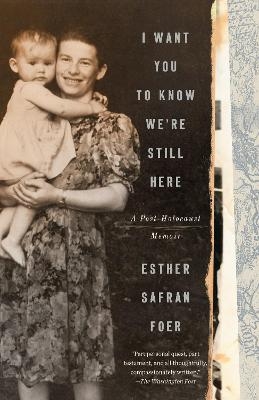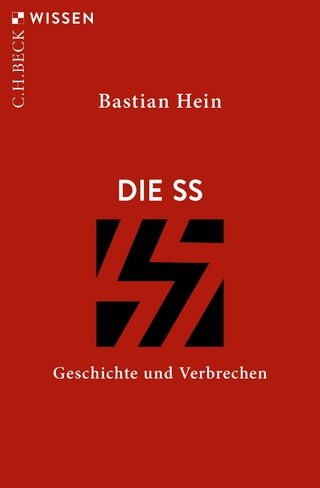
I Want You to Know We're Still Here
Tim Duggan Books (Verlag)
978-0-593-23669-7 (ISBN)
- Titel ist leider vergriffen;
keine Neuauflage - Artikel merken
"A beautiful exploration of collective memory and Jewish history."-Nathan Englander
"Esther Safran Foer is a force of nature: a leader of the Jewish people, the matriarch of America's leading literary family, an eloquent defender of the proposition that memory matters. And now, a riveting memoirist."-Jeffrey Goldberg, editor in chief of The Atlantic
Esther Safran Foer grew up in a home where the past was too terrible to speak of. The child of parents who were each the sole survivors of their respective families, for Esther the Holocaust loomed in the backdrop of daily life, felt but never discussed. The result was a childhood marked by painful silences and continued tragedy. Even as she built a successful career, married, and raised three children, Esther always felt herself searching.
So when Esther's mother casually mentions an astonishing revelation-that her father had a previous wife and daughter, both killed in the Holocaust-Esther resolves to find out who they were, and how her father survived. Armed with only a black-and-white photo and a hand-drawn map, she travels to Ukraine, determined to find the shtetl where her father hid during the war. What she finds reshapes her identity and gives her the opportunity to finally mourn.
I Want You to Know We're Still Here is the poignant and deeply moving story not only of Esther's journey but of four generations living in the shadow of the Holocaust. They are four generations of survivors, storytellers, and memory keepers, determined not just to keep the past alive but to imbue the present with life and more life.
Esther Safran Foer was the CEO of Sixth & I, a center for arts, ideas, and religion. She lives in Washington, D.C., with her husband, Bert. They are the parents of Franklin, Jonathan, and Joshua, and the grandparents of six.
1 My birth certificate says that I was born on September 8, 1946, in Ziegenhain, Germany. It's the wrong date, wrong city, wrong country. It would take me years to understand why my father created this fabrication. Why, each year, my mother came into my room on March 17 and gave me a kiss and whispered, "Happy birthday." Piecing together the fragments of my family story has been a lifelong pursuit. I am the offspring of Holocaust survivors, which, by definition, means there is a tragic and complicated history. My childhood was filled with silences that were punctuated by occasional shocking disclosures. I understood there was a lot that I didn't know, besides the secret of my invented birthday. My parents were reluctant to speak of the past, and I learned to maneuver around difficult subjects. When I was in my early forties, preparing to give a talk at a local synagogue, I decided that this might be a good opportunity to fill in a few gaps of our family story. I sat down with my mother in the pink kitchen of her 1950s-suburban tract house, on a street where most of the other homes were occupied by families of Holocaust survivors. Sitting at her faux-marble laminate kitchen table, I could see the carefully cut coupons sorted into neat piles by the refrigerator, ready for the next shopping trip. In the cabinet below, there was enough flour and cereal, all of it purchased on sale, to withstand a major catastrophe. I started with a few questions about my father and his experience during the war. He had been an enigma, a mercurial figure that all conversation danced around, even in my own head. My mother took a sip of the instant coffee that she loved and casually mentioned that my father had been in a ghetto with his wife and daughter. He'd been on a work detail when they were both murdered by the Nazis. Absolutely stunned, I blurted out, "He had a wife and daughter? Why haven't you ever told me this before? How can you be telling me now for the first time?" I had grown up surrounded by ghosts-haunted by relatives who were rarely talked about and by the stories that no one would share. Now there was a new ghost that I hadn't even known about-my own sister. I pressed my mother for more, but she made it clear that the conversation was over. Genug shoyn. Enough already. I'm not sure how much she even knew about his family-I suspected that she and my father didn't speak much of the past, even to each other. Life was all about moving forward. I walked out of my mother's house in a daze. I didn't know it then, but this was the beginning of a search that would define the next phase of my life. Determined to learn more, I scoured online Holocaust databases to see if I could find a birth or death record of my sister, to no avail. I hired researchers in Ukraine. I even hired an FBI agent to analyze photographs. My searches came up empty. I talked to everyone I could think of to see what they knew, and I got the same response: "There were so many people killed, so many babies, how can we remember all of the names?" I didn't want all of the names. I wanted the name of my sister. Of the person closest to me killed in the Holocaust, my half sibling, I had not one detail, not a name, not a picture-not one piece of a memory. Here was a child, one among at least six million Jews, one of almost 1.5 million children who were murdered during the Holocaust, and there was no way to remember that this child had even lived. How do you remember someone who has left no trace? The search took me to places that allowed me to more deeply understand the Holocaust and how it continued to reverberate long past the liberation and into future generations. It was ultimately a search that took me to places inside myself that scared me. It has been said that Jews are an ahistorical people, concerned more with memory than history. A curious fact: There is no word in the Hebrew l
| Erscheinungsdatum | 19.03.2020 |
|---|---|
| Zusatzinfo | B/W PHOTOS THROUGHOUT |
| Sprache | englisch |
| Maße | 141 x 210 mm |
| Gewicht | 215 g |
| Themenwelt | Literatur ► Biografien / Erfahrungsberichte |
| Literatur ► Briefe / Tagebücher | |
| Geschichte ► Allgemeine Geschichte ► 1918 bis 1945 | |
| Geschichte ► Allgemeine Geschichte ► Zeitgeschichte | |
| Geschichte ► Teilgebiete der Geschichte ► Militärgeschichte | |
| Schlagworte | Auschwitz • autobiographies • Autobiography • Biographies • Biographies and Memoirs • Biography • European History • Family • Family history • Franklin Foer • gifts for mom • History • history gifts • history lovers gifts • Holocaust • holocaust books • holocaust memoirs • Holocaust survivor books • Identity • Israel • Jewish • jewish books • Jewish History • Jonathan Safran Foer • Joshua Foer • Judaism • Memoir • Memoirs • Nazi • Poland • Polish • Survival • The Holocaust • True story • Ukraine • ukrainian • war • World War 2 • world war 2 books • World War II • ww2 • WWII |
| ISBN-10 | 0-593-23669-6 / 0593236696 |
| ISBN-13 | 978-0-593-23669-7 / 9780593236697 |
| Zustand | Neuware |
| Haben Sie eine Frage zum Produkt? |
aus dem Bereich


